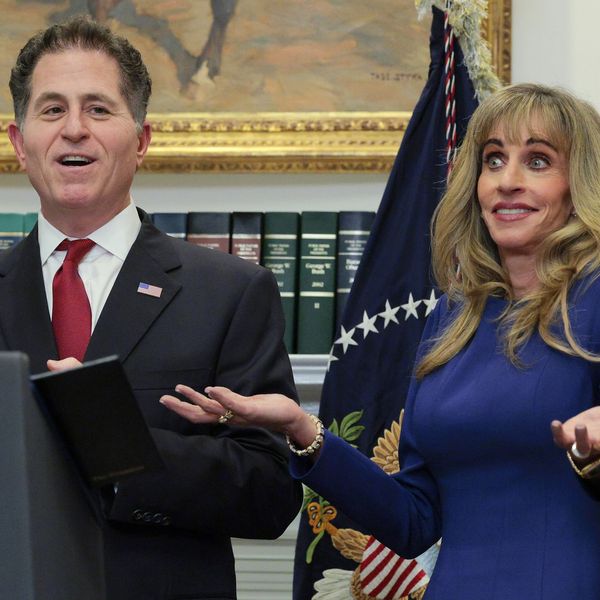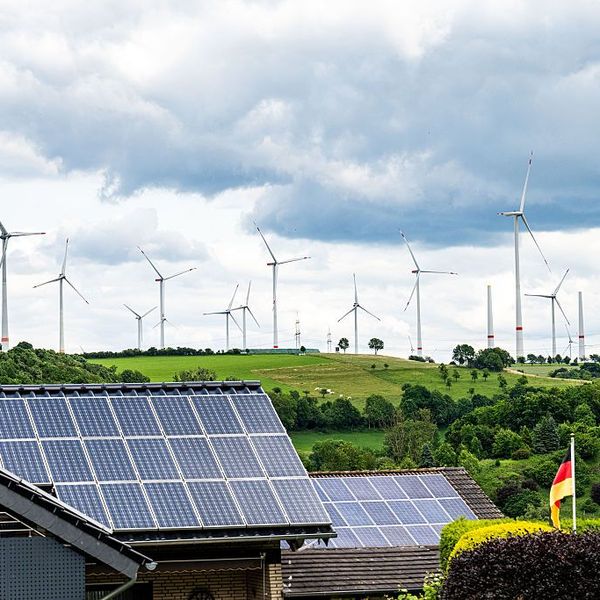Tax Billionaires, Carbon to Improve Prosperity, says UN
Taxing the world's wealthiest individuals and placing a global tax on carbon emissions are just a couple of the ways that the world can achieve economic stability, adapt to out of control climate change, and improve prosperity for millions of people, according to a new UN survey.
The report, which cites the repeated failure of the world's wealthiest nations to fulfill development commitments and a nearly $167 billion shortfall in 2011 for projects designed to help the world's poor and most vulnerable, recommends a new regiment of revenue-generating programs including a carbon tax, a currency transaction tax and a billionaires tax to fill the widening gap.
Taken together, the UN estimates such programs could raise as much as $400 billion annually to aid the poor, fight climate change and help meet the Millennium Development Goals.
"We are suggesting various ways to tap resources through international mechanisms, such as coordinated taxes on carbon emissions, air traffic and financial and currency transactions," said Robert Vos, Director of the Development and Analysis Division in the Department of Economic and Social Affairs and lead author of World Economic and Social Survey 2012, which is subtitled "In Search of New Development Finance (pdf)".
While donors must still meet their commitments, new resources must be found, Vos stressed, and innovative mechanisms must be explored. Such taxes also make economic sense, the report argues, as they help stimulate green growth and mitigate financial market instability. "In short, such new financing mechanisms will help donor countries overcome their record of broken promises to their own benefit and the world at large," he said.
Responding to questions about the feasibility of a global carbon tax, Vos said some European countries, in addition to Australia and Canada, had already introduced it and most economists agreed that it was probably the best way to influence consumer behavior and reduce the use of fossil fuels.
The report recognizes, and Vos reinterated, that a global tax on billionaires would be difficult to achieve politically, especially in the United States. But, the report says, "The 'average' billionaire would own $3.7 billion after paying the tax. If that billionaire spent $1,000 per day, it would take him or her over 10,000 years to spend all his or her wealth."
There world is home to at least 1,225 billionaires from 58 countries, according to Forbes magazine. The United States alone is home to more than 400 of them.
In order to reach the $400 billion mark, the report suggest the following mechanisms:
- a tax on carbon dioxide emissions in developed countries: a tax of $25 per tonne would raise an estimated $250 billion per year, collected by national authorities, but earmarked for international cooperation;
- a tiny currency transaction tax of one half of a "basis point" (0.005 per cent) on all trading in four major currencies (the dollar, euro, yen and pound sterling), which could yield an estimated $40 billion per year for international cooperation;
- earmarking a portion of the proposed European Union financial transaction tax (which is expected to raise up to EUR55 billion or $71 billion per year) for international cooperation;
- regular allocations of IMF special drawing rights (SDRs) and use of "idle" SDRs could yield about $100 billion per year for the purchase of long-term assets which would then be used as development finance.
# # #
An Urgent Message From Our Co-Founder
Dear Common Dreams reader, The U.S. is on a fast track to authoritarianism like nothing I've ever seen. Meanwhile, corporate news outlets are utterly capitulating to Trump, twisting their coverage to avoid drawing his ire while lining up to stuff cash in his pockets. That's why I believe that Common Dreams is doing the best and most consequential reporting that we've ever done. Our small but mighty team is a progressive reporting powerhouse, covering the news every day that the corporate media never will. Our mission has always been simple: To inform. To inspire. And to ignite change for the common good. Now here's the key piece that I want all our readers to understand: None of this would be possible without your financial support. That's not just some fundraising cliche. It's the absolute and literal truth. We don't accept corporate advertising and never will. We don't have a paywall because we don't think people should be blocked from critical news based on their ability to pay. Everything we do is funded by the donations of readers like you. Will you donate now to help power the nonprofit, independent reporting of Common Dreams? Thank you for being a vital member of our community. Together, we can keep independent journalism alive when it’s needed most. - Craig Brown, Co-founder |
Taxing the world's wealthiest individuals and placing a global tax on carbon emissions are just a couple of the ways that the world can achieve economic stability, adapt to out of control climate change, and improve prosperity for millions of people, according to a new UN survey.
The report, which cites the repeated failure of the world's wealthiest nations to fulfill development commitments and a nearly $167 billion shortfall in 2011 for projects designed to help the world's poor and most vulnerable, recommends a new regiment of revenue-generating programs including a carbon tax, a currency transaction tax and a billionaires tax to fill the widening gap.
Taken together, the UN estimates such programs could raise as much as $400 billion annually to aid the poor, fight climate change and help meet the Millennium Development Goals.
"We are suggesting various ways to tap resources through international mechanisms, such as coordinated taxes on carbon emissions, air traffic and financial and currency transactions," said Robert Vos, Director of the Development and Analysis Division in the Department of Economic and Social Affairs and lead author of World Economic and Social Survey 2012, which is subtitled "In Search of New Development Finance (pdf)".
While donors must still meet their commitments, new resources must be found, Vos stressed, and innovative mechanisms must be explored. Such taxes also make economic sense, the report argues, as they help stimulate green growth and mitigate financial market instability. "In short, such new financing mechanisms will help donor countries overcome their record of broken promises to their own benefit and the world at large," he said.
Responding to questions about the feasibility of a global carbon tax, Vos said some European countries, in addition to Australia and Canada, had already introduced it and most economists agreed that it was probably the best way to influence consumer behavior and reduce the use of fossil fuels.
The report recognizes, and Vos reinterated, that a global tax on billionaires would be difficult to achieve politically, especially in the United States. But, the report says, "The 'average' billionaire would own $3.7 billion after paying the tax. If that billionaire spent $1,000 per day, it would take him or her over 10,000 years to spend all his or her wealth."
There world is home to at least 1,225 billionaires from 58 countries, according to Forbes magazine. The United States alone is home to more than 400 of them.
In order to reach the $400 billion mark, the report suggest the following mechanisms:
- a tax on carbon dioxide emissions in developed countries: a tax of $25 per tonne would raise an estimated $250 billion per year, collected by national authorities, but earmarked for international cooperation;
- a tiny currency transaction tax of one half of a "basis point" (0.005 per cent) on all trading in four major currencies (the dollar, euro, yen and pound sterling), which could yield an estimated $40 billion per year for international cooperation;
- earmarking a portion of the proposed European Union financial transaction tax (which is expected to raise up to EUR55 billion or $71 billion per year) for international cooperation;
- regular allocations of IMF special drawing rights (SDRs) and use of "idle" SDRs could yield about $100 billion per year for the purchase of long-term assets which would then be used as development finance.
# # #
Taxing the world's wealthiest individuals and placing a global tax on carbon emissions are just a couple of the ways that the world can achieve economic stability, adapt to out of control climate change, and improve prosperity for millions of people, according to a new UN survey.
The report, which cites the repeated failure of the world's wealthiest nations to fulfill development commitments and a nearly $167 billion shortfall in 2011 for projects designed to help the world's poor and most vulnerable, recommends a new regiment of revenue-generating programs including a carbon tax, a currency transaction tax and a billionaires tax to fill the widening gap.
Taken together, the UN estimates such programs could raise as much as $400 billion annually to aid the poor, fight climate change and help meet the Millennium Development Goals.
"We are suggesting various ways to tap resources through international mechanisms, such as coordinated taxes on carbon emissions, air traffic and financial and currency transactions," said Robert Vos, Director of the Development and Analysis Division in the Department of Economic and Social Affairs and lead author of World Economic and Social Survey 2012, which is subtitled "In Search of New Development Finance (pdf)".
While donors must still meet their commitments, new resources must be found, Vos stressed, and innovative mechanisms must be explored. Such taxes also make economic sense, the report argues, as they help stimulate green growth and mitigate financial market instability. "In short, such new financing mechanisms will help donor countries overcome their record of broken promises to their own benefit and the world at large," he said.
Responding to questions about the feasibility of a global carbon tax, Vos said some European countries, in addition to Australia and Canada, had already introduced it and most economists agreed that it was probably the best way to influence consumer behavior and reduce the use of fossil fuels.
The report recognizes, and Vos reinterated, that a global tax on billionaires would be difficult to achieve politically, especially in the United States. But, the report says, "The 'average' billionaire would own $3.7 billion after paying the tax. If that billionaire spent $1,000 per day, it would take him or her over 10,000 years to spend all his or her wealth."
There world is home to at least 1,225 billionaires from 58 countries, according to Forbes magazine. The United States alone is home to more than 400 of them.
In order to reach the $400 billion mark, the report suggest the following mechanisms:
- a tax on carbon dioxide emissions in developed countries: a tax of $25 per tonne would raise an estimated $250 billion per year, collected by national authorities, but earmarked for international cooperation;
- a tiny currency transaction tax of one half of a "basis point" (0.005 per cent) on all trading in four major currencies (the dollar, euro, yen and pound sterling), which could yield an estimated $40 billion per year for international cooperation;
- earmarking a portion of the proposed European Union financial transaction tax (which is expected to raise up to EUR55 billion or $71 billion per year) for international cooperation;
- regular allocations of IMF special drawing rights (SDRs) and use of "idle" SDRs could yield about $100 billion per year for the purchase of long-term assets which would then be used as development finance.
# # #

